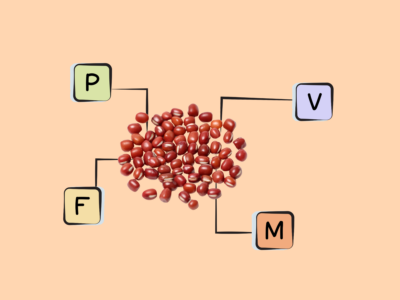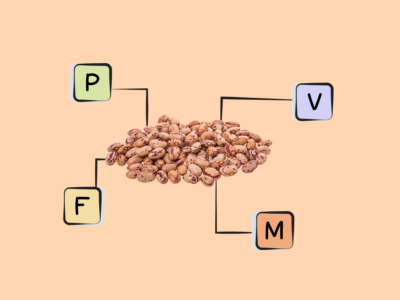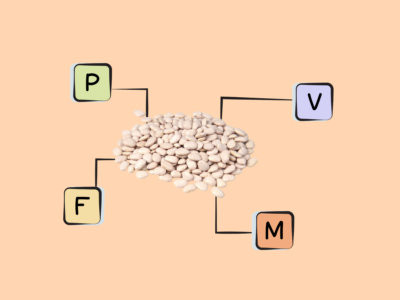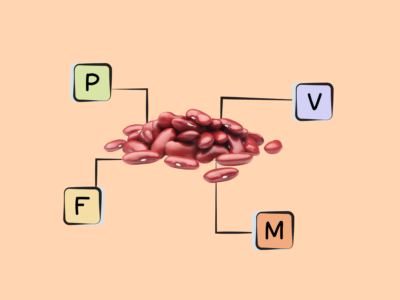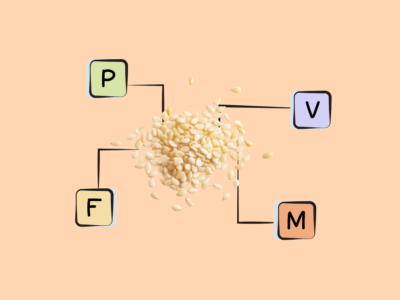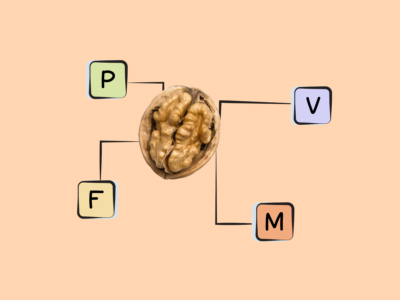Key Takeaways (expand)
- Magnesium is a mineral that’s essential for every cell, and is the fourth most abundant mineral in the body.
- Magnesium serves as a cofactor for hundreds of different enzymes, and is involved in over 300 metabolic reactions in the body.
- One of magnesium’s most important functions is in energy production: ATP (the primary energy carrier in cells) is only biologically active when it binds to a magnesium ion; likewise, every enzyme that synthesizes or uses ATP needs magnesium in order to carry out its functions.
- All enzymes that synthesize DNA and RNA require magnesium for their catalytic action.
- Magnesium is also needed for enzymes involved in synthesizing fats and carbohydrates.
- Magnesium functions as an electrolyte, giving it a role in regulating nerve and muscle function, regulating fluid balance, maintaining blood pH, and transmitting nerve signals.
- Magnesium serves direct structural roles in the body, especially in forming skeletal tissue, muscle tissue, cell membranes, and chromosomes.
- Magnesium assists in the metabolism of several other nutrients, including phosphorus, potassium, calcium, sodium, B-complex vitamins, vitamin E, and vitamin C.
- Magnesium works in conjunction with vitamin D and calcium support bone health, including helping maintain calcium homeostasis and assisting in vitamin D metabolism.
- Studies show magnesium could help protect against metabolic syndrome and diabetes, possibly via an anti-inflammatory pathway and by enhancing the function of pancreatic beta-cells.
- Magnesium also supports cardiovascular health: it can help reduce risk factors like hypertension and vascular calcification, and is associated with a reduction in cardiovascular outcomes like fatal heart attacks and stroke.
- There’s some evidence that magnesium could be protective against asthma and migraine headaches.
- Long-term magnesium deficiency can increase the risk of of osteoporosis, metabolic syndrome, hypertension, type 2 diabetes, and cardiovascular disease.
- Rich sources of magnesium include green leafy vegetables, fish, nuts and seeds, legumes, whole grains, avocados, cocoa, spices, and low-fat dairy products.
Table of Contents[Hide][Show]
Magnesium is the fourth most abundant mineral in the human body, and is essential for every cell. Despite being widespread in nature, it never occurs in its free (unbound) form—only in combination with other elements, particularly oxygen, calcium, or carbon. The word magnesium itself is named after a district in Greece called Magnesia (which in turn is named after an ancient Greek tribe called the Magnetes), due to the area’s abundance of magnesia alba, AKA magnesium oxide.
Magnesium was first recognized as an element in 1755, and then officially isolated in 1808 by the English chemist Sir Humphry Davy (who was also the first to isolate sodium, calcium, potassium, strontium, and barium!). However, magnesium’s healing properties were discovered as early as 1618, when a farmer from Epsom, England noticed that the town’s bitter-tasting spring water appeared to heal scratches and rashes—and, when boiled down, yielded a salty mineral powder. This quickly led to the rise of “Epsom salt,” which we now know is made of magnesium sulfate (and which put Epsom on the map as a spa town, attracting visitors from near and far to its medicinal waters!).
Magnesium serves as a cofactor for hundreds of different enzymes, and is involved in numerous pathways in the body—including energy production, ion transport, cell signaling, protein synthesis, and nucleic acid synthesis. It also serves important structural functions in bone tissue and cells.
Importantly, this nutrient functions as an electrolyte—a class of minerals that dissociate into charged particles (called ions) when dissolved in solution, making them capable of conducting electricity. On the whole, electrolytes help regulate fluid balance within the body, regulate nerve and muscle function (including the heart!), maintain a normal blood pH, and transmit nerve signals!
Magnesium-rich foods include green leafy vegetables, nuts and seeds (especially pumpkin seeds, almonds, and cashews), fish, legumes, whole grains, cocoa, avocados, and spices. Low-fat dairy products (like milk and yogurt) are also good sources of magnesium.
Ready to Make Healthy Eating Feel Effortless?

Join the FREE 90-day Nutrivore90 Challenge and build lasting habits with no food rules, no guilt—just real progress.
- Weekly downloads, journal prompts, and reflection tools—all completely free.
- Focus on nutrient density, not restriction
- Nutrivore90 starts January 5th, 2026!
The Biological Roles of Magnesium
Magnesium is involved in over 300 metabolic reactions in the body, giving it a huge number of diverse functions. One of the most important is energy production—the metabolism of fats and carbohydrates to create fuel for cells. ATP, the basic energy currency of cells, mostly exists as a complex with magnesium (in the form of MgATP) because it’s only biologically active when it binds to a magnesium ion. What’s more, every enzyme that uses or synthesizes ATP requires magnesium to carry out its functions. Magnesium is also needed for several enzymes involved in the synthesis of carbohydrates and fats, giving this mineral multiple roles in the body’s use of macronutrients!
Magnesium is also needed for producing some extremely important molecules, including DNA, RNA, and proteins. In fact, all enzymes that synthesize DNA and RNA require magnesium for their catalytic action. And, the “master antioxidant” glutathione can only be synthesized with the help of magnesium.
Magnesium is also essential for nerve conduction and neuromuscular contractions. It affects muscle relaxation and contraction by directly acting on cell membranes (magnesium ions are able to close certain calcium channels, which allow positively charged calcium ions to pass into neurons), as well as through its role in phosphorylation processes and reactions requiring ATP. Magnesium is even required for moving glucose from the blood and into the muscles!
Additionally, magnesium (as a complex with ATP) is needed for forming the cell-signaling molecule cyclic adenosine monophosphate (cAMP). This molecule is involved in parathyroid hormone (PTH) secretion, the release of insulin from beta cells in the pancreas (and as a consequence, blood sugar control), regulation of carbohydrate and lipid metabolism, ion channel regulation, memory, immune function, gene regulation, and more!
Magnesium also serves direct structural roles: the human body contains about 25 g of magnesium, over half of which is found in the skeleton, and the remainder being in soft tissue (especially the muscle). It also plays a structural role in cell membranes and chromosomes.
Interactions with Other Nutrients
Notably, magnesium also has some interactions with other nutrients. For one, it’s important for the metabolism of phosphorus, calcium, potassium, sodium, B-complex vitamins, and vitamins C and E. High-dose zinc supplements have been shown to interfere with magnesium absorption and disrupt the body’s magnesium balance (the difference between intake versus loss of magnesium). Dietary protein intake also appears to influence magnesium absorption, with low dietary protein intakes (especially under 30 g per day) resulting in reduced magnesium absorption. Lastly, experimental studies suggest that very high intakes of fiber could decrease magnesium utilization—but, given that many high-fiber foods are also rich in magnesium, this is unlikely to cause problems in the context of a varied, nutrient-dense diet!
Meanwhile, magnesium helps support bone health by working in conjunction with vitamin D and calcium to maintain calcium homeostasis. For one, magnesium and vitamin D have a synergistic relationship: vitamin D slightly increases the amount of magnesium absorbed in the intestines, and magnesium is needed for enzymatic conversion of vitamin D to its active form (1,25(OH)D3) for vitamin D metabolism in the kidneys and liver, and for the binding of vitamin D to its target proteins. (Vitamin D, in turn, plays an essential role in calcium absorption, and works with the parathyroid gland to regulate the amount of calcium that’s deposited in or taken from bones.) And, while calcium intake doesn’t appear to effect magnesium balance, magnesium insufficiency can cause low calcium concentrations in the blood—in turn triggering the release of calcium from bone tissue, potentially reducing bone mineral density over time.
Drug Interactions with Magnesium
Magnesium is known to interact with several drugs. It can interfere with the absorption of antibiotics, bisphosphonates (a class of anti-osteoporosis drugs), certain statins, the thyroid medication levothyroxine, and some anti-seizure drugs like gabapentin if taken too soon before or after these medications. And, magnesium in the form of magnesium hydroxide (commonly found in antacids) can actually increase the absorption of some anti-diabetes drugs, potentially affecting blood sugar control. Low magnesium is known to increase the risk of adverse effects of the drug digoxin.
Some diuretics can cause magnesium depletion.
Everything You Need to Jump into Nutrivore TODAY!

Nutrivore Quickstart Guide
The Nutrivore Quickstart Guide e-book explains why and how to eat a Nutrivore diet, introduces the Nutrivore Score, gives a comprehensive tour of the full range of essential and important nutrients!
Plus, you’ll find the Top 100 Nutrivore Score Foods, analysis of food groups, practical tips to increase the nutrient density of your diet, and look-up tables for the Nutrivore Score of over 700 foods.
Buy now for instant digital access.
Magnesium in Health and Disease
Given its role for a huge number of enzymes, it isn’t surprising that magnesium has a protective effect against a number of health conditions. Getting enough magnesium is important for skeletal health, both due to its structural role in bone tissue and through its interactions with other nutrients (especially calcium and vitamin D). Research suggests it has a protective effect against cardiovascular disease, metabolic syndrome, hypertension, type 2 diabetes, and osteoporosis. There’s even some evidence it could help prevent migraine headaches and asthma.
Magnesium and Metabolic Syndrome
Magnesium may help prevent metabolic syndrome from developing (including high blood pressure, obesity, insulin resistance, and dysregulated blood lipids). Studies have shown that people with the highest versus lowest intakes of magnesium (at least 355 mg per day, versus less than 197 mg per day) have nearly a third lower risk of developing metabolic syndrome. Although the mechanisms behind this link still need more investigating, trials have shown that magnesium supplementation can reduce markers of inflammation (most notably C-reactive protein), suggesting that magnesium could help protect against metabolic disorders through an anti-inflammatory pathway.
Magnesium and Cardiovascular Disease
Similarly, magnesium may be a major boon for cardiovascular health. Both observational studies and intervention trials have linked magnesium with a reduction in cardiovascular disease risk factors like hypertension and vascular calcification, and dietary magnesium intake is associated with a significantly lower risk of cardiovascular disease itself (in some studies, a nearly 40% lower risk of fatal heart attacks for people in the highest versus lowest quintile of magnesium intake!). A large meta-analysis found that for every 200 mg incremental increase of magnesium per day, cardiovascular risk disease risk dropped by 22%. And in people with existing coronary artery disease, high blood pressure, or diabetes, magnesium supplementation can improve blood flow in the arteries, indicating a benefit for endothelial function (an important component of cardiovascular health!).
Higher magnesium intakes have also been associated with reduction in stroke risk (up to a 12% lower risk for people with the highest versus lowest magnesium intakes, and a 7% reduction in stroke risk for every 100 mg increase in daily magnesium intake). And, although fewer studies have been conducted on magnesium and heart failure, some prospective studies show that higher magnesium intake may be protective against this condition, too.
Magnesium and Diabetes
Another health benefit of magnesium is a potentially protective effect against diabetes. Both type 1 and type 2 diabetics tend to have disproportionately low serum levels of magnesium, likely due to excess loss in the urine (a consequence of abnormal glucose metabolism); magnesium depletion, in turn, seems to worsen insulin resistance and adversely impact blood sugar control. So, not surprisingly, higher magnesium intakes appear to be particularly beneficial for diabetics (as well as those at risk of developing it!).
A large meta-analysis of prospective studies found that higher versus lower magnesium intakes were associated with a 17% reduced risk of developing type 2 diabetes; other research has estimated up to a 15% decrease in diabetes risk for every 100 mg increase in dietary magnesium intake each day. Controlled trials also indicate the use of magnesium supplements can improve the function of pancreatic beta-cells (leading to lower fasting blood sugar and insulin concentrations), reduce insulin resistance, and improve other metabolic markers like triglycerides and HDL cholesterol, especially in people who start off with magnesium deficiency.
And specifically in those who are already diabetic, magnesium supplementation has been shown to lower fasting blood sugar levels, as well as improve measures of insulin sensitivity and blood sugar control.
Magnesium and Bone Health
Because of its role in skeletal health (both structurally and by assisting in the metabolism of bone-relevant nutrients like vitamin D), magnesium helps support strong bones and protect against osteoporosis. Greater dietary intakes of magnesium have been associated with higher bone mineral density, both in specific sites and in the body as a whole, and some studies have found up to a 23% lower risk of lower arm and wrist fractures among women in the highest versus lowest quintile of magnesium intake.
Observational research also shows that hip fracture risk is significantly lower in areas where the local drinking water contains higher levels of magnesium. In the small number of controlled trials conducted so far, magnesium supplementation (specifically in postmenopausal women) has resulted in greater bone mineral density in the wrist and heel, as well as a reduction in the rate of osteoporotic bone loss.
And, in children with vitamin-D resistant rickets (meaning their rickets doesn’t respond to vitamin D supplementation), magnesium supplementation has been shown to reverse the condition.
Magnesium and Asthma
Interestingly, getting enough magnesium may also help with asthma. People with asthma appear to have a greater occurrence of low serum magnesium levels compared to people without asthma, and some clinical trials have found that intravenous magnesium can help with acute asthmatic attacks in both children and adults (mechanistically, magnesium can support bronchodilation by interfering with mechanisms that trigger bronchoconstriction, through its ability to facilitate calcium influx within airway smooth muscle cells).
Magnesium and Pregnancy
In pregnant women with preeclampsia or eclampsia (potentially dangerous hypertensive disorders that can occur after 20 weeks’ gestation), magnesium in the form of magnesium sulfate is administered to prevent seizures. In fact, a number of controlled trials have found that magnesium sulfate is significantly more effective than the anticonvulsant drug diazepam for this purpose!
In premature infants, too, studies have shown that magnesium may help prevent brain damage, and when administered to mothers before giving birth, significantly reduces the risk of the baby having cerebral palsy.
Magnesium and Migraine Headaches
Some evidence suggests that magnesium supplements, in the form of 400 to 500 mg of magnesium oxide daily, can help prevent migraine headaches. This is likely due to magnesium’s ability to block a wave of brain activity called cortical spreading depression, which affects cortical neurons and frequently precedes migraines.
Magnesium, Testosterone and Exercise
Magnesium also has some interesting interactions with testosterone and exercise. Several studies have found that compared to exercise alone, magnesium supplementation increases the amount of unbound testosterone in the body among people who perform strength-training or low-resistance exercise. In elderly men, serum magnesium has also been shown to positively correlate with testosterone (though cause-and-effect can’t be determined here without conducting controlled studies!).
Magnesium and Autoimmune Disease
Lastly, magnesium depletion has been shown to have a profound impact on the thymus gland (an important immune system organ), which has implications for all autoimmune diseases. Although links between magnesium deficiency and autoimmune disease have not been extensively studied, some research has found a link between magnesium and systemic lupus erythematosus.
Didn’t know magnesium was this amazing? Maybe your friends will enjoy this too!
Health Effects of Magnesium Deficiency
Although true magnesium deficiency is rare (due to the high magnesium content of many foods, and due to the kidneys’ ability to adjust magnesium secretion when intake is low), insufficiency is fairly common. By some estimates, only about half of the US population consumes adequate amounts of magnesium, and in developed countries in general, subclinical magnesium deficiency (defined as serum magnesium levels under 0.80 mmol/L) occurs in up to 30% of the population.
People at particularly high risk of deficiency include those with gastrointestinal disorders (including celiac disease and Crohn’s disease), chronic diarrhea, kidney disease and long-term diuretic use (which increases magnesium loss through the kidneys), proton pump inhibitor use (which decreases intestinal magnesium absorption), and alcoholism (due to a combination of poor dietary intake, increased urinary loss, and gastrointestinal disturbances). Diabetes and other endocrine or metabolic disorders (such as parathyroid gland disorders, primary aldosteronism, and phosphate depletion) can deplete magnesium from the body and increase the risk of deficiency. And, because of age-related decreases in magnesium absorption alongside age-related increases in urinary magnesium excretion, the elderly are also more susceptible to magnesium deficiency.
Magnesium deficiency often doesn’t have any overt symptoms at first, but can be identified through a decrease in serum magnesium levels (hypomagnesemia), followed by a decrease in serum calcium levels (hypocalcemia) even if dietary calcium intake is adequate. Once symptoms do manifest, the earliest ones tend to be fatigue, nausea, vomiting, loss of appetite, and body weakness. As magnesium deficiency progresses, symptoms can worsen to include numbness, spasms, cramps, tingling, tremors, abnormal heart rhythms, personality changes, and seizures. And, even at levels that don’t cause acute deficiency symptoms, long-term insufficient magnesium intake can contribute to a higher risk of osteoporosis, metabolic syndrome, hypertension, type 2 diabetes, and cardiovascular disease.
Want to know the top 25 foods for this awesome nutrient?

The Top 25 Foods for Every Nutrient
The Top 25 Foods for Every Nutrient e-book is a well-organized, easy-to-use, grocery store-friendly guide to help you choose foods that fit your needs of 43 important nutrients while creating a balanced nutrient-dense diet.
Get two “Top 25” food lists for each nutrient, plus you’ll find RDA charts for everyone, informative visuals, fun facts, serving sizes and the 58 foods that are Nutrient Super Stars!
Buy now for instant digital access.
Problems From Too Much Magnesium
Although magnesium supplementation is generally safe, high doses can cause gastrointestinal side effects such as nausea, diarrhea, and abdominal cramping. (In fact, supplemental magnesium—typically in the form of magnesium citrate—has a known laxative effect, due to its ability to increase fluid in the small intestine!) Some forms of magnesium, such as magnesium lactate, may be gentler on the digestive system. If you require high-dose magnesium supplementation, be sure to seek medical advice from a healthcare provider in order to prevent unwanted side effects.
That being said, while no adverse effects of magnesium have been observed when getting this mineral from whole-food sources, high-dose magnesium supplements can cause gastrointestinal upset and diarrhea, and it’s recommended that adults keep supplemental magnesium intake to 350 mg daily or less (not including dietary sources) in order to avoid this! Magnesium supplements in the form of amino acid chelates (such as magnesium glycinate) are generally better tolerated by the gastrointestinal system, and sustained-release magnesium supplements can prevent diarrhea altogether.
In some cases, very high intakes of supplemental magnesium can lead to hypermagnesemia (elevated blood concentrations of magnesium)—which can cause toxicity symptoms like low blood pressure, confusion, lethargy, and disturbed heart rhythm. In severe cases, hypermagnesemia can even cause cardiac arrest. Because healthy kidneys are typically able to excrete excess magnesium when intake is high, people with existing kidney disorders are at the greatest risk of magnesium toxicity.

Need More Magnesium?
- Two different formulas: Morning and Evening
- Highly absorbable
- Formulated for easy digestion
- No fillers, additives or preservatives
- Free of all common allergens
How Much Magnesium Do We Need?
The recommended dietary allowance (RDA) for magnesium is 310 mg per day for women aged 19 through 30, then 320 mg for the rest of adulthood; for men, it’s 400 mg of magnesium daily for the ages of 19 through 30, then 420 mg daily for the years beyond. However, these guidelines are calculated based on what’s needed for avoiding deficiency, not necessarily what’s needed for optimal health and disease prevention—so, more may very well be better.
| 0 – 6 months | |||||
| 6 months to < 12 months | |||||
| 1 yr – 3 yrs | |||||
| 4 yrs – 8 yrs | |||||
| 9 yrs – 13 yrs | |||||
| 14 yrs – 18 yrs | |||||
| 19 yrs – 50 yrs | |||||
| 51+ yrs | |||||
| Pregnant (14 – 18 yrs) | |||||
| Pregnant (19 – 30 yrs) | |||||
| Pregnant (31 – 50 yrs) | |||||
| Lactating (14 – 18 yrs) | |||||
| Lactating (19 – 30 yrs) | |||||
| Lactating (31 – 50 yrs) |
Nutrient Daily Values
Nutrition requirements and recommended nutrient intake for infants, children, adolescents, adults, mature adults, and pregnant and lactating individuals.
Best Food Sources of Magnesium
The following foods have high concentrations of magnesium, containing at least 50% of the recommended dietary allowance per serving, making them our best food sources of this valuable mineral!
Want to know the top 500 most nutrient-dense foods?

Top 500 Nutrivore Foods
The Top 500 Nutrivore Foods e-book is an amazing reference deck of the top 500 most nutrient-dense foods according to their Nutrivore Score. Think of it as the go-to resource for a super-nerd, to learn more and better understand which foods stand out, and why!
If you are looking for a quick-reference guide to help enhance your diet with nutrients, and dive into the details of your favorite foods, this book is your one-stop-shop!
Buy now for instant digital access.
Good Food Sources of Magnesium
The following foods are also excellent or good sources of magnesium, containing at least 10% (and up to 50%) of the daily value per serving.
Nutrivore Is a Game-Changer—This FREE Guide Shows You Why
Sign up for the free Nutrivore Newsletter, your weekly, science-backed guide to improving health through nutrient-rich foods — without dieting harder —and get the Beginner’s Guide to Nutrivore delivered straight to your inbox!

Citations
Expand to see all scientific references for this article.
Ascherio A, Hennekens C, Willett WC, Sacks F, Rosner B, Manson J, Witteman J, Stampfer MJ. Prospective study of nutritional factors, blood pressure, and hypertension among US women. Hypertension. 1996 May;27(5):1065-72. doi: 10.1161/01.hyp.27.5.1065.
Ascherio A, Rimm EB, Giovannucci EL, Colditz GA, Rosner B, Willett WC, Sacks F, Stampfer MJ. A prospective study of nutritional factors and hypertension among US men. Circulation. 1992 Nov;86(5):1475-84. doi: 10.1161/01.cir.86.5.1475.
Aydin H, Deyneli O, Yavuz D, Gözü H, Mutlu N, Kaygusuz I, Akalin S. Short-term oral magnesium supplementation suppresses bone turnover in postmenopausal osteoporotic women. Biol Trace Elem Res. 2010 Feb;133(2):136-43. doi: 10.1007/s12011-009-8416-8.
Beasley R, Aldington S. Magnesium in the treatment of asthma. Curr Opin Allergy Clin Immunol. 2007 Feb;7(1):107-10. doi: 10.1097/ACI.0b013e328012ce4b.
Bressendorff I, Hansen D, Schou M, Silver B, Pasch A, Bouchelouche P, Pedersen L, Rasmussen LM, Brandi L. Oral Magnesium Supplementation in Chronic Kidney Disease Stages 3 and 4: Efficacy, Safety, and Effect on Serum Calcification Propensity-A Prospective Randomized Double-Blinded Placebo-Controlled Clinical Trial. Kidney Int Rep. 2016 Dec 30;2(3):380-389. doi: 10.1016/j.ekir.2016.12.008.
Castiglioni S, Cazzaniga A, Albisetti W, Maier JA. Magnesium and osteoporosis: current state of knowledge and future research directions. Nutrients. 2013 Jul 31;5(8):3022-33. doi: 10.3390/nu5083022.
Chen T, Carter BS. Role of magnesium sulfate in aneurysmal subarachnoid hemorrhage management: A meta-analysis of controlled clinical trials. Asian J Neurosurg. 2011 Jan;6(1):26-31. doi: 10.4103/1793-5482.85632.
Chiuve SE, Sun Q, Curhan GC, Taylor EN, Spiegelman D, Willett WC, Manson JE, Rexrode KM, Albert CM. Dietary and plasma magnesium and risk of coronary heart disease among women. J Am Heart Assoc. 2013 Mar 18;2(2):e000114. doi: 10.1161/JAHA.113.000114.
Cosaro E, Bonafini S, Montagnana M, Danese E, Trettene MS, Minuz P, Delva P, Fava C. Effects of magnesium supplements on blood pressure, endothelial function and metabolic parameters in healthy young men with a family history of metabolic syndrome. Nutr Metab Cardiovasc Dis. 2014 Nov;24(11):1213-20. doi: 10.1016/j.numecd.2014.05.010.
Costello RB, Nielsen F. Interpreting magnesium status to enhance clinical care: key indicators. Curr Opin Clin Nutr Metab Care. 2017 Nov;20(6):504-511. doi: 10.1097/MCO.0000000000000410.
Crowther CA, Brown J, McKinlay CJ, Middleton P. Magnesium sulphate for preventing preterm birth in threatened preterm labour. Cochrane Database Syst Rev. 2014 Aug 15;(8):CD001060. doi: 10.1002/14651858.CD001060.pub2.
Crowther CA, Middleton PF, Voysey M, Askie L, Duley L, Pryde PG, Marret S, Doyle LW; AMICABLE Group. Assessing the neuroprotective benefits for babies of antenatal magnesium sulphate: An individual participant data meta-analysis. PLoS Med. 2017 Oct 4;14(10):e1002398. doi: 10.1371/journal.pmed.1002398.
Darooghegi Mofrad M, Djafarian K, Mozaffari H, Shab-Bidar S. Effect of magnesium supplementation on endothelial function: A systematic review and meta-analysis of randomized controlled trials. Atherosclerosis. 2018 Jun;273:98-105. doi: 10.1016/j.atherosclerosis.2018.04.020.
Del Gobbo LC, Imamura F, Wu JH, de Oliveira Otto MC, Chiuve SE, Mozaffarian D. Circulating and dietary magnesium and risk of cardiovascular disease: a systematic review and meta-analysis of prospective studies. Am J Clin Nutr. 2013 Jul;98(1):160-73. doi: 10.3945/ajcn.112.053132.
Dibaba DT, Xun P, Fly AD, Yokota K, He K. Dietary magnesium intake and risk of metabolic syndrome: a meta-analysis. Diabet Med. 2014 Nov;31(11):1301-9. doi: 10.1111/dme.12537.
Dibaba DT, Xun P, He K. Dietary magnesium intake is inversely associated with serum C-reactive protein levels: meta-analysis and systematic review. Eur J Clin Nutr. 2014 Apr;68(4):510-6. doi: 10.1038/ejcn.2014.7.
DiNicolantonio JJ, O’Keefe JH, Wilson W. Subclinical magnesium deficiency: a principal driver of cardiovascular disease and a public health crisis. Open Heart. 2018 Jan 13;5(1):e000668. doi: 10.1136/openhrt-2017-000668. Erratum in: Open Heart. 2018 Apr 5;5(1):e000668corr1.
Dong JY, Xun P, He K, Qin LQ. Magnesium intake and risk of type 2 diabetes: meta-analysis of prospective cohort studies. Diabetes Care. 2011 Sep;34(9):2116-22. doi: 10.2337/dc11-0518.
Fang X, Han H, Li M, Liang C, Fan Z, Aaseth J, He J, Montgomery S, Cao Y. Dose-Response Relationship between Dietary Magnesium Intake and Risk of Type 2 Diabetes Mellitus: A Systematic Review and Meta-Regression Analysis of Prospective Cohort Studies. Nutrients. 2016 Nov 19;8(11):739. doi: 10.3390/nu8110739.
Fang X, Wang K, Han D, He X, Wei J, Zhao L, Imam MU, Ping Z, Li Y, Xu Y, Min J, Wang F. Dietary magnesium intake and the risk of cardiovascular disease, type 2 diabetes, and all-cause mortality: a dose-response meta-analysis of prospective cohort studies. BMC Med. 2016 Dec 8;14(1):210. doi: 10.1186/s12916-016-0742-z.
Fogarty A, Lewis SA, Scrivener SL, Antoniak M, Pacey S, Pringle M, Britton J. Oral magnesium and vitamin C supplements in asthma: a parallel group randomized placebo-controlled trial. Clin Exp Allergy. 2003 Oct;33(10):1355-9. doi: 10.1046/j.1365-2222.2003.01777.x.
Grundy SM, Cleeman JI, Daniels SR, Donato KA, Eckel RH, Franklin BA, Gordon DJ, Krauss RM, Savage PJ, Smith SC Jr, Spertus JA, Costa F; American Heart Association; National Heart, Lung, and Blood Institute. Diagnosis and management of the metabolic syndrome: an American Heart Association/National Heart, Lung, and Blood Institute Scientific Statement. Circulation. 2005 Oct 25;112(17):2735-52. doi: 10.1161/CIRCULATIONAHA.105.169404.
Han H, Fang X, Wei X, Liu Y, Jin Z, Chen Q, Fan Z, Aaseth J, Hiyoshi A, He J, Cao Y. Dose-response relationship between dietary magnesium intake, serum magnesium concentration and risk of hypertension: a systematic review and meta-analysis of prospective cohort studies. Nutr J. 2017 May 5;16(1):26. doi: 10.1186/s12937-017-0247-4.
Hashimoto Y, Nishimura Y, Maeda H, Yokoyama M. Assessment of magnesium status in patients with bronchial asthma. J Asthma. 2000 Sep;37(6):489-96. doi: 10.3109/02770900009055475.
He K, Liu K, Daviglus ML, Morris SJ, Loria CM, Van Horn L, Jacobs DR Jr, Savage PJ. Magnesium intake and incidence of metabolic syndrome among young adults. Circulation. 2006 Apr 4;113(13):1675-82. doi: 10.1161/CIRCULATIONAHA.105.588327.
Hruby A, O’Donnell CJ, Jacques PF, Meigs JB, Hoffmann U, McKeown NM. Magnesium intake is inversely associated with coronary artery calcification: the Framingham Heart Study. JACC Cardiovasc Imaging. 2014 Jan;7(1):59-69. doi: 10.1016/j.jcmg.2013.10.006.
Institute of Medicine (US) Standing Committee on the Scientific Evaluation of Dietary Reference Intakes. Dietary Reference Intakes for Calcium, Phosphorus, Magnesium, Vitamin D, and Fluoride. Washington (DC): National Academies Press (US); 1997. 6, Magnesium.
Joosten MM, Gansevoort RT, Mukamal KJ, Kootstra-Ros JE, Feskens EJ, Geleijnse JM, Navis G, Bakker SJ; PREVEND Study Group. Urinary magnesium excretion and risk of hypertension: the prevention of renal and vascular end-stage disease study. Hypertension. 2013 Jun;61(6):1161-7. doi: 10.1161/HYPERTENSIONAHA.113.01333.
Ju SY, Choi WS, Ock SM, Kim CM, Kim DH. Dietary magnesium intake and metabolic syndrome in the adult population: dose-response meta-analysis and meta-regression. Nutrients. 2014 Dec 22;6(12):6005-19. doi: 10.3390/nu6126005.
Kass L, Weekes J, Carpenter L. Effect of magnesium supplementation on blood pressure: a meta-analysis. Eur J Clin Nutr. 2012 Apr;66(4):411-8. doi: 10.1038/ejcn.2012.4.
Kew KM, Kirtchuk L, Michell CI. Intravenous magnesium sulfate for treating adults with acute asthma in the emergency department. Cochrane Database Syst Rev. 2014 May 28;(5):CD010909. doi: 10.1002/14651858.CD010909.pub2.
La SA, Lee JY, Kim DH, Song EL, Park JH, Ju SY. Low Magnesium Levels in Adults with Metabolic Syndrome: a Meta-Analysis. Biol Trace Elem Res. 2016 Mar;170(1):33-42. doi: 10.1007/s12011-015-0446-9.
Larsson SC, Orsini N, Wolk A. Dietary magnesium intake and risk of stroke: a meta-analysis of prospective studies. Am J Clin Nutr. 2012 Feb;95(2):362-6. doi: 10.3945/ajcn.111.022376.
Lee SY, Hyun YY, Lee KB, Kim H. Low serum magnesium is associated with coronary artery calcification in a Korean population at low risk for cardiovascular disease. Nutr Metab Cardiovasc Dis. 2015 Nov;25(11):1056-61. doi: 10.1016/j.numecd.2015.07.010.
Liao F, Folsom AR, Brancati FL. Is low magnesium concentration a risk factor for coronary heart disease? The Atherosclerosis Risk in Communities (ARIC) Study. Am Heart J. 1998 Sep;136(3):480-90. doi: 10.1016/s0002-8703(98)70224-8.
Maggio M, De Vita F, Lauretani F, Nouvenne A, Meschi T, Ticinesi A, Dominguez LJ, Barbagallo M, Dall’aglio E, Ceda GP. The Interplay between Magnesium and Testosterone in Modulating Physical Function in Men. Int J Endocrinol. 2014;2014:525249. doi: 10.1155/2014/525249.
Magnesium: Fact Sheet for Health Professionals. National Institutes of Health (NIH) Office of Dietary Supplements. 2 Jun 2022.
Major RW, Cheng MRI, Grant RA, Shantikumar S, Xu G, Oozeerally I, Brunskill NJ, Gray LJ. Cardiovascular disease risk factors in chronic kidney disease: A systematic review and meta-analysis. PLoS One. 2018 Mar 21;13(3):e0192895. doi: 10.1371/journal.pone.0192895.
Makrides M, Crosby DD, Bain E, Crowther CA. Magnesium supplementation in pregnancy. Cochrane Database Syst Rev. 2014 Apr 3;2014(4):CD000937. doi: 10.1002/14651858.CD000937.pub2.
McDonald SD, Lutsiv O, Dzaja N, Duley L. A systematic review of maternal and infant outcomes following magnesium sulfate for pre-eclampsia/eclampsia in real-world use. Int J Gynaecol Obstet. 2012 Aug;118(2):90-6. doi: 10.1016/j.ijgo.2012.01.028.
Melanson KJ, Angelopoulos TJ, Nguyen VT, Martini M, Zukley L, Lowndes J, Dube TJ, Fiutem JJ, Yount BW, Rippe JM. Consumption of whole-grain cereals during weight loss: effects on dietary quality, dietary fiber, magnesium, vitamin B-6, and obesity. J Am Diet Assoc. 2006 Sep;106(9):1380-8; quiz 1389-90. doi: 10.1016/j.jada.2006.06.003.
Moore-Schiltz L, Albert JM, Singer ME, Swain J, Nock NL. Dietary intake of calcium and magnesium and the metabolic syndrome in the National Health and Nutrition Examination (NHANES) 2001-2010 data. Br J Nutr. 2015 Sep 28;114(6):924-35. doi: 10.1017/S0007114515002482.
Navarro-González JF, Mora-Fernández C, García-Pérez J. Clinical implications of disordered magnesium homeostasis in chronic renal failure and dialysis. Semin Dial. 2009 Jan-Feb;22(1):37-44. doi: 10.1111/j.1525-139X.2008.00530.x.
Nie ZL, Wang ZM, Zhou B, Tang ZP, Wang SK. Magnesium intake and incidence of stroke: meta-analysis of cohort studies. Nutr Metab Cardiovasc Dis. 2013 Mar;23(3):169-76. doi: 10.1016/j.numecd.2012.04.015.
Orchard TS, Larson JC, Alghothani N, Bout-Tabaku S, Cauley JA, Chen Z, LaCroix AZ, Wactawski-Wende J, Jackson RD. Magnesium intake, bone mineral density, and fractures: results from the Women’s Health Initiative Observational Study. Am J Clin Nutr. 2014 Apr;99(4):926-33. doi: 10.3945/ajcn.113.067488.
Peacock JM, Folsom AR, Arnett DK, Eckfeldt JH, Szklo M. Relationship of serum and dietary magnesium to incident hypertension: the Atherosclerosis Risk in Communities (ARIC) Study. Ann Epidemiol. 1999 Apr;9(3):159-65. doi: 10.1016/s1047-2797(98)00040-4.
Pham PC, Pham PM, Pham SV, Miller JM, Pham PT. Hypomagnesemia in patients with type 2 diabetes. Clin J Am Soc Nephrol. 2007 Mar;2(2):366-73. doi: 10.2215/CJN.02960906.
Qu X, Jin F, Hao Y, Li H, Tang T, Wang H, Yan W, Dai K. Magnesium and the risk of cardiovascular events: a meta-analysis of prospective cohort studies. PLoS One. 2013;8(3):e57720. doi: 10.1371/journal.pone.0057720.
Rennenberg RJ, Kessels AG, Schurgers LJ, van Engelshoven JM, de Leeuw PW, Kroon AA. Vascular calcifications as a marker of increased cardiovascular risk: a meta-analysis. Vasc Health Risk Manag. 2009;5(1):185-97. doi: 10.2147/vhrm.s4822.
Sakaguchi Y, Hamano T, Nakano C, Obi Y, Matsui I, Kusunoki Y, Mori D, Oka T, Hashimoto N, Takabatake Y, Takahashi A, Kaimori JY, Moriyama T, Yamamoto R, Horio M, Sugimoto K, Yamamoto K, Rakugi H, Isaka Y. Association between Density of Coronary Artery Calcification and Serum Magnesium Levels among Patients with Chronic Kidney Disease. PLoS One. 2016 Sep 23;11(9):e0163673. doi: 10.1371/journal.pone.0163673.
Sarrafzadegan N, Khosravi-Boroujeni H, Lotfizadeh M, Pourmogaddas A, Salehi-Abargouei A. Magnesium status and the metabolic syndrome: A systematic review and meta-analysis. Nutrition. 2016 Apr;32(4):409-17. doi: 10.1016/j.nut.2015.09.014.
Schwartz R, Walker G, Linz MD, MacKellar I. Metabolic responses of adolescent boys to two levels of dietary magnesium and protein. I. Magnesium and nitrogen retention. Am J Clin Nutr. 1973 May;26(5):510-8. doi: 10.1093/ajcn/26.5.510.
Scott D, Blizzard L, Fell J, Giles G, Jones G. Associations between dietary nutrient intake and muscle mass and strength in community-dwelling older adults: the Tasmanian Older Adult Cohort Study. J Am Geriatr Soc. 2010 Nov;58(11):2129-34. doi: 10.1111/j.1532-5415.2010.03147.x.
Sebastian RS, Cleveland LE, Goldman JD, Moshfegh AJ. Older adults who use vitamin/mineral supplements differ from nonusers in nutrient intake adequacy and dietary attitudes. J Am Diet Assoc. 2007 Aug;107(8):1322-32. doi: 10.1016/j.jada.2007.05.010.
Simental-Mendía LE, Rodríguez-Morán M, Guerrero-Romero F. Failure of beta-cell function for compensate variation in insulin sensitivity in hypomagnesemic subjects. Magnes Res. 2009 Sep;22(3):151-6.
Simental-Mendía LE, Sahebkar A, Rodríguez-Morán M, Guerrero-Romero F. A systematic review and meta-analysis of randomized controlled trials on the effects of magnesium supplementation on insulin sensitivity and glucose control. Pharmacol Res. 2016 Sep;111:272-282. doi: 10.1016/j.phrs.2016.06.019.
Sojka JE, Weaver CM. Magnesium supplementation and osteoporosis. Nutr Rev. 1995 Mar;53(3):71-4. doi: 10.1111/j.1753-4887.1995.tb01505.x.
Spencer H, Norris C, Williams D. Inhibitory effects of zinc on magnesium balance and magnesium absorption in man. J Am Coll Nutr. 1994 Oct;13(5):479-84. doi: 10.1080/07315724.1994.10718438.
Stendig-Lindberg G, Tepper R, Leichter I. Trabecular bone density in a two year controlled trial of peroral magnesium in osteoporosis. Magnes Res. 1993 Jun;6(2):155-63.
Takaya J, Higashino H, Kobayashi Y. Intracellular magnesium and insulin resistance. Magnes Res. 2004 Jun;17(2):126-36.
Veronese N, Berton L, Carraro S, Bolzetta F, De Rui M, Perissinotto E, Toffanello ED, Bano G, Pizzato S, Miotto F, Coin A, Manzato E, Sergi G. Effect of oral magnesium supplementation on physical performance in healthy elderly women involved in a weekly exercise program: a randomized controlled trial. Am J Clin Nutr. 2014 Sep;100(3):974-81. doi: 10.3945/ajcn.113.080168.
Wannamethee SG, Papacosta O, Lennon L, Whincup PH. Serum magnesium and risk of incident heart failure in older men: The British Regional Heart Study. Eur J Epidemiol. 2018 Sep;33(9):873-882. doi: 10.1007/s10654-018-0388-6.
Welch AA, Kelaiditi E, Jennings A, Steves CJ, Spector TD, MacGregor A. Dietary Magnesium Is Positively Associated With Skeletal Muscle Power and Indices of Muscle Mass and May Attenuate the Association Between Circulating C-Reactive Protein and Muscle Mass in Women. J Bone Miner Res. 2016 Feb;31(2):317-25. doi: 10.1002/jbmr.2692.
Wolf HT, Hegaard HK, Greisen G, Huusom L, Hedegaard M. Treatment with magnesium sulphate in pre-term birth: a systematic review and meta-analysis of observational studies. J Obstet Gynaecol. 2012 Feb;32(2):135-40. doi: 10.3109/01443615.2011.638999.
Wu X, Wang C, Zhu J, Zhang C, Zhang Y, Gao Y. Meta-analysis of randomized controlled trials on magnesium in addition to beta-blocker for prevention of postoperative atrial arrhythmias after coronary artery bypass grafting. BMC Cardiovasc Disord. 2013 Jan 23;13:5. doi: 10.1186/1471-2261-13-5.
Xu T, Sun Y, Xu T, Zhang Y. Magnesium intake and cardiovascular disease mortality: a meta-analysis of prospective cohort studies. Int J Cardiol. 2013 Sep 10;167(6):3044-7. doi: 10.1016/j.ijcard.2012.11.090.
Zhang X, Li Y, Del Gobbo LC, Rosanoff A, Wang J, Zhang W, Song Y. Effects of Magnesium Supplementation on Blood Pressure: A Meta-Analysis of Randomized Double-Blind Placebo-Controlled Trials. Hypertension. 2016 Aug;68(2):324-33. doi: 10.1161/HYPERTENSIONAHA.116.07664.
Zhang X, Xia J, Del Gobbo LC, Hruby A, Dai Q, Song Y. Serum magnesium concentrations and all-cause, cardiovascular, and cancer mortality among U.S. adults: Results from the NHANES I Epidemiologic Follow-up Study. Clin Nutr. 2018 Oct;37(5):1541-1549. doi: 10.1016/j.clnu.2017.08.021.
Zheng J, Mao X, Ling J, He Q, Quan J, Jiang H. Association between serum level of magnesium and postmenopausal osteoporosis: a meta-analysis. Biol Trace Elem Res. 2014 Jun;159(1-3):8-14. doi: 10.1007/s12011-014-9961-3.




